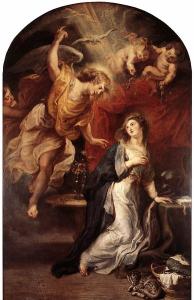Several “why didn’t they use these terms?” arguments
[originally posted on Facebook on 8-31-22]
*
We see such arguments used to deny Mary’s perpetual virginity, so why not the other way around, too?
We see such arguments used to deny Mary’s perpetual virginity, so why not the other way around, too?
*
For example, Jesus’ “brethren” in Scripture are never called the children of Mary, and Mary is never called their mother, as in the case of Jesus:
*
John 2:1 (RSV) On the third day there was a marriage at Cana in Galilee, and the mother of Jesus was there;*John 19:25 . . . standing by the cross of Jesus were his mother, and his mother’s sister, Mary the wife of Clopas, and Mary Mag’dalene.*
In at least two instances, these “brothers” were mentioned but Mary wasn’t called their mother; only Jesus‘ mother:
*
Acts 1:14 All these with one accord devoted themselves to prayer, together with the women and Mary the mother of Jesus, and with his brothers.*Mark 6:3 Is not this the carpenter, the son of Mary and brother of James and Joses and Judas and Simon, and are not his sisters here with us?” . . .
*
Doesn’t it stand to reason and isn’t it common sense that if these “brothers” were indeed the siblings of Jesus, that Acts 1:14 would read, instead: “Mary the mother of Jesus and his brothers”? Then we wouldn’t be having this dispute; it would have been so clear and undeniable. A similar argument could be made for Mark 6:3.
*
But instead, we have Jesus only being called “the son of Mary” there, while “son of Mary” referring to someone besides Jesus, or the phrase “sons of Mary” never appear in Holy Scripture.
*
Adelphos (“brother”) was used in the NT because it was following Aramaic / Hebrew cultural practice. They would say “brother” for both siblings and cousins and even for nephews (Abraham and Lot). We have to think how they thought then in that culture and with that language, not like we do today.
*
But even today we often use “brother” in the broader sense: “Band of brothers”, “Brother Jed will preach the sermon today”, “Brother” and “sister” for monks and nuns (and non-literal “Father” for priests), “am I my brother’s keeper?”, Ringo Starr (an only child) calling the other three Beatles “brothers” etc.
*
“Cousin” appears four times in the entire OT in the RSV (three of those in Jeremiah, another in Leviticus). But “brother[s]” appears 390 times, “brethren” 154 times and “sister[s]” 110 times. So by a 654-4 ratio, we have those terms (which at first glance sound like siblings) used over against “cousin.” Obviously, many times they were used for non-sibling relatives. Here are some examples of that:
*
Lot, who was called Abraham’s “brother” (Gen. 14:14), was the son of Haran, Abraham’s sibling (Gen. 11:26–28); therefore, was Abraham’s nephew, not his sibling or blood brother. Jacob is, likewise, referred to as the “brother” of Laban, who was literally his uncle (Gen. 29:15). Eleazar’s daughters married their “brethren,” who were the sons of Kish (Eleazar’s literal sibling). These “brethren”, then, were actually their first cousins (1 Chr. 23:21–22).
*
“Brother” and “sister” could also refer to kinsmen (Dt. 23:7; Neh. 5:7; Jer. 34:9), as in the reference to the forty-two “brethren” of King Azariah (2 Kgs. 10:13–14). Many more such examples could be given.
*
The NT (which came out of the same culture, and was Jewish-written save for Luke) totally reflects this. It has “brother[s]” 159 times, “brethren” 191, and “sister[s]” 24 times, while “cousin” appears exactly once (Col 4:10).
*
So that’s a 374-1 ratio (even more lopsided than the OT), and for the entire Bible (minus the Deuterocanon), the numbers are 1028-5, or “cousin” used instead of “brother” or “sister” once in every 206 times a relative is mentioned.
*
And so we see the exact same thing in the NT (use of “brother” for “cousin”) that occurs in the OT: in comparing Matthew 27:56, Mark 15:40, and John 19:25, we find that James and Joseph (mentioned in Matthew 13:55 with Simon and Jude as Jesus’ “brothers”) are the sons of Mary, wife of Clopas.
*
This other Mary (Mt 27:61; 28:1) is called Our Lady’s adelphe in John 19:25. Obviously, there are not two women named “Mary” in one family. One opinion, based on early patristic evidence, that I hold myself, is that this second Mary was the Blessed Virgin Mary’s sister in-law (Clopas being Joseph’s sibling). In this scenario, a sister-in-law is called “sister” in the NT (which we often do today in our own culture). In any event, we know for sure, from the above information, that James and Joseph were not Jesus’ siblings. They were likely His first cousins, or possibly more distant cousins.
*
Jude is called the Lord’s “brother” in Matthew 13:55 and Mark 6:3. If this is the same Jude who wrote the epistle bearing that name (as many think), he calls himself “a servant of Jesus Christ and brother of James” (Jude 1:1). Now, suppose for a moment that he was Jesus’ blood brother. In that case, he refrains from referring to himself as the Lord’s own sibling (while we are told that such a phraseology occurs several times in the New Testament, referring to a sibling relationship) and chooses instead to identify himself as James’ brother. This is far too strange and implausible to believe.
*
Moreover, James also refrains from calling himself Jesus’ brother, in his epistle (James 1:1: “servant of God and of the Lord Jesus Christ”): even though St. Paul calls him “the Lord’s brother” (Gal 1:19).
*
Strikingly, it looks like every time St. Paul uses adelphos (unless I missed one or two), he means it as something other than blood brother or sibling. He uses the word or related cognates no less than 138 times in this way. Yet we often hear about Galatians 1:19: “James the Lord’s brother.” 137 other times, Paul means non-sibling, yet amazingly enough, here he must mean sibling, because (so we are told) he uses the word adelphos? That doesn’t make any sense.
*
***
Seemingly “Only Son” References to Jesus, With His “Brothers” Apparently Placed in a Category Other Than Siblings / Liberal Protestant Version (LPV) Fashionable, Trendy Renderings [1-6-24]
Another little interesting tidbit to ponder, is how two Gospel writers (recording spoken words) described Jesus and His brothers in relation to Mary:
*
*
Mark 6:3 “Is not this the carpenter, the son of Mary and brother of James and Joses and Judas and Simon, and are not his sisters here with us?” And they took offense at him.
*
Matthew 13:55 “Is not this the carpenter’s son? Is not his mother called Mary? And are not his brothers James and Joseph and Simon and Judas?”
*
What is notable is the singular use of “son” in describing Jesus. This would seem to (at the very least, possibly) suggest “only son.” Importantly, it’s in the context of mentioning four of His “brothers” and also “sisters” in Mark. Now, if they are all understood to be — and were in fact — His siblings, why is He called “the son of Mary” and “the carpenter’s son”? Note also that in both passages, only He is called Mary’s “son” and also Joseph’s (in Matthew). The others are not.
What is notable is the singular use of “son” in describing Jesus. This would seem to (at the very least, possibly) suggest “only son.” Importantly, it’s in the context of mentioning four of His “brothers” and also “sisters” in Mark. Now, if they are all understood to be — and were in fact — His siblings, why is He called “the son of Mary” and “the carpenter’s son”? Note also that in both passages, only He is called Mary’s “son” and also Joseph’s (in Matthew). The others are not.
*
It seems to me (maybe I’m weird), as an argument from implausibility, that this is not the language we would expect God to inspire the evangelists to use (remember, we’re talking about divinely inspired revelation), if in fact, Jesus had siblings. It would have been easy as pie for these passages to read so clearly, so manifestly plain, that there never would have been any dispute about the nature of the “brothers” of Jesus. All it would have taken would be a few changes of words. I submit that the passages would have read something like the following, if Jesus had siblings:
*
*
Mark 6:3 [Liberal Protestant Version: LPV] “Is not this the carpenter, one of the sons of Mary, along with his brothers James and Joses and Judas and Simon, and are not his sisters here with us?” And they took offense at him.
*
Matthew 13:55 “Is not this one of the carpenter’s sons? Is not his mother and the mother of his brothers James and Joseph and Simon and Judas called Mary?”
*
One good reason why at least James and Joseph are not described as the Blessed Virgin Mary’s son in these passages, is because they are specifically called in other passages the sons of “the other Mary”: who is called a “sister” of Jesus’ mother Mary. The Bible is self-consistent as always.
*
*
Simple; easy; elementary. Instead, we get “the son of Mary” and “the carpenter’s son”: even when “brothers” are being discussed in the same context. These “brothers” and “sisters” are neither described as sons or daughters of Mary, nor of Joseph. Only Jesus is, using the singular “son.”
*
There are at least three other similar passages, from the other two Gospel writers (Luke wrote the Book of Acts):
John 1:45 Philip found Nathan’a-el, and said to him, “We have found him of whom Moses in the law and also the prophets wrote, Jesus of Nazareth, the son of Joseph.”
John 6:42 They said, “Is not this Jesus, the son of Joseph, whose father and mother we know? . . .
Acts 1:14 All these with one accord devoted themselves to prayer, together with the women and Mary the mother of Jesus, and with his brothers.
See how in the latter, a distinction is made between Mary as the mother of Jesus and “his brothers”, who are not called Mary’s sons? Nor is she called their mother.
*
*
The Liberal Protestant Version (LPV) would likely render these “too Catholic” verses as follows — and if Jesus had siblings, I think God would have made that crystal clear in Holy Scripture (saving us all of these endless disputes and wranglings about it):
*
John 1:45 Philip found Nathan’a-el, and said to him, “We have found him of whom Moses in the law and also the prophets wrote, Jesus of Nazareth, one of the sons [or, “children”] of Joseph.”
*John 6:42 They said, “Is not this Jesus, one of the sons of Joseph, whose father and mother we know? . . .”
*Acts 1:14 All these with one accord devoted themselves to prayer, together with the women and Mary the mother of Jesus and his brothers.
*
But God didn’t make it plain and undeniable. Those verses do not read that way. I’d like to ask those who deny Mary’s perpetual virginity: why do you think that is? Why wouldn’t God have made it easy to understand and logically and grammatically impossible to deny, if Jesus had siblings?
*
But God didn’t make it plain and undeniable. Those verses do not read that way. I’d like to ask those who deny Mary’s perpetual virginity: why do you think that is? Why wouldn’t God have made it easy to understand and logically and grammatically impossible to deny, if Jesus had siblings?
*
There were many opportunities and contexts in Holy Scripture where this could easily have taken place, but for some odd reason they never do. And so, here we are 2,000 years later debating the issue, since Protestants in the late 17th and early 18th centuries decided to depart from the rest of Christendom and start denying that the Blessed Virgin Mary was a perpetual virgin.
*
*
***
Practical Matters: Perhaps some of my 4,300+ free online articles (the most comprehensive “one-stop” Catholic apologetics site) or fifty-three books have helped you (by God’s grace) to decide to become Catholic or to return to the Church, or better understand some doctrines and why we believe them.
*
Or you may believe my work is worthy to support for the purpose of apologetics and evangelism in general. If so, please seriously consider a much-needed financial contribution. I’m always in need of more funds: especially monthly support. “The laborer is worthy of his wages” (1 Tim 5:18, NKJV). 1 December 2021 was my 20th anniversary as a full-time Catholic apologist, and February 2022 marked the 25th anniversary of my blog.
*
PayPal donations are the easiest: just send to my email address: [email protected]. You’ll see the term “Catholic Used Book Service”, which is my old side-business. To learn about the different methods of contributing, including 100% tax deduction, etc., see my page: About Catholic Apologist Dave Armstrong / Donation Information. Thanks a million from the bottom of my heart!
***
Photo credit: The Annunciation, by Peter Paul Rubens (1577-1640) [public domain / Wikimedia Commons]
***
Summary: Explanation of how Hebrew culture used “brother” to describe non-siblings, and various interesting descriptions that are consistent with Mary’s Perpetual Virginity.














